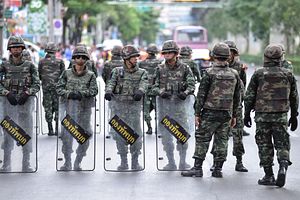As an excellent piece in the Associated Press notes this week, Thailand’s junta appears to be entrenching itself for the long haul. Junta leader Prayuth Chan-ocha has named himself to Thailand’s Board of Investment. The junta is putting other cronies at the heads of major state-controlled companies, Prayuth has left the timetable for a total return to civilian rule purposefully vague, and the coup leaders also have refused to say exactly what that civil government will look like, or what Thailand’s next constitution will look like either. (The generals essentially ripped up the previous constitution after launching the coup in May.)
However, you can bet that the “democracy” Thais inherit some time after the junta steps down is going to bear little resemblance to the political system in Thailand of the past fifteen years – or to internationally accepted norms of what constitutes democracy. Having learned from Thailand’s 2006 coup, when the army failed to totally undermine the power of rural voters, the junta likely will push through new legislation that will never allow Thailand’s numerical majority to prevail over other power centers again.
Instead, expect the post-coup “democratic” government to look like this:
1. Appointed members of parliament or those selected from Hong Kong-style “functional constituencies” will have immense power in the next civilian government. The People’s Democratic Reform Committee protestors, who paralyzed Bangkok for months in late 2013 and early 2014 and helped trigger the coup, often pushed for such a scheme. A scheme in which appointed members of parliament constitute a large percentage of the chambers would dilute the rural majority’s power and keep Bangkok effectively in control of the legislature, which is especially important during a monarchical succession. (This idea of non-elected MPs has a long history, and dates back to previous elite protests in Thailand in the late 2000s.) The army leaders have said that they want to cool political temperatures and do not favor any side of Thailand’s poisonous color-coded politics, but that vow of neutrality already has been proven completely false. Expect the military to push through an appointed/functional constituencies scheme in which at least half of parliament’s upper and lower house (the Senate previously had non-elected members) is selected this way.
2. Prominent members of Thaksinite parties will be banned from politics for life, unless they have already turned tail and totally given into the junta, like former Thaksin ally and former Minister of Agriculture Sudarat Keyuraphan. Since Thaksin first won the prime ministership in 2001, the judiciary, the palace, and the military have used five-year bans to keep pro-Thaksin politicians out of office, but the elites underestimated the staying power of Thaksin and of rural voters. Indeed, many politicians who were banned, like former minister Chaturon Chaiseng, were able to come back after five years and again lead Thaksinite parties and serve in ministerial positions. Expect the army and its selected constitution drafters (all of whom will be appointed and not elected) to find a way to keep the most important pro-Thaksin politicians out of politics for the rest of their lives. It used to be said that, in Thailand, everyone in politics always gets a chance to come back, no matter what they have done in the past…but that was then, and this is a different time in the kingdom.
3. The judiciary and other institutions will be made even stronger. Since 2006, the judiciary and other bureaucratic institutions have been key weapons in the Bangkok elites and middle classes’ battle to maintain control of politics, but at times Thaksinite parties have managed to put some of their own allies in key judicial and bureaucratic posts. No more. The junta will leave a constitution and legislation that both makes the judiciary and other institutions stronger and insulates these institutions from any control at all by an elected prime minister.
4. The army’s constitution drafters will figure out a way to provide an amnesty for the 2014 coup-makers who, after all, broke the law by seizing power. Amnesty for the coup-makers? That’s one Thai tradition that isn’t going out of style.
Joshua Kurlantzick is a fellow for Southeast Asia at the Council on Foreign Relations. He blogs at Asia Unbound, where this piece originally appeared. You can follow him on Twitter: @JoshKurlantzick

































